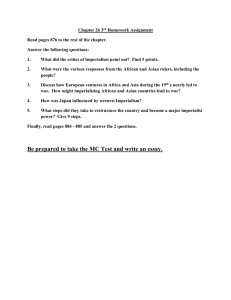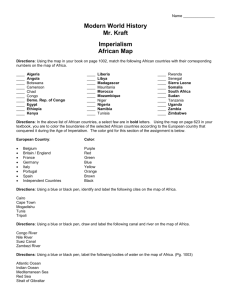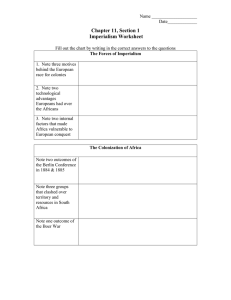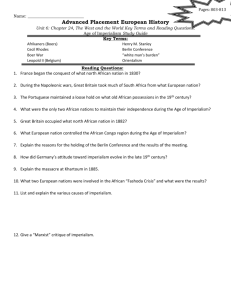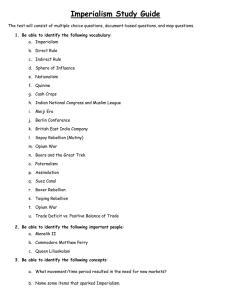European Imperialism in Africa Imperialism = a policy of
advertisement
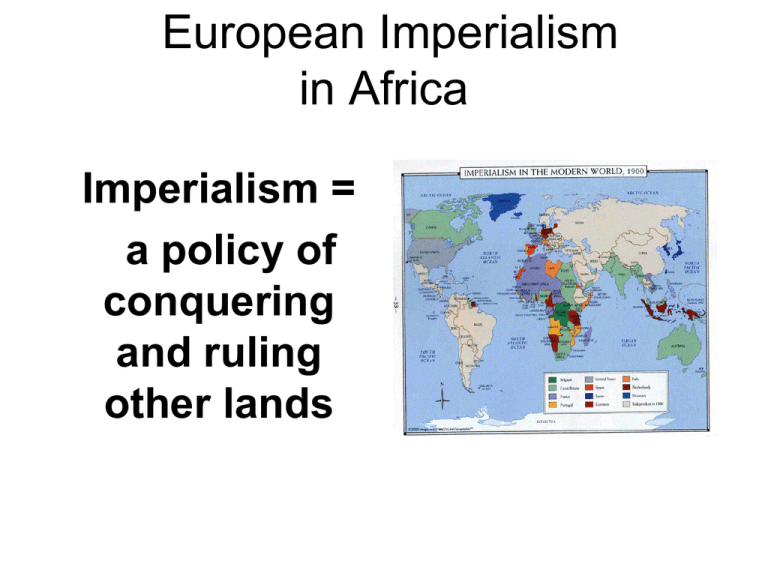
European Imperialism in Africa Imperialism = a policy of conquering and ruling other lands African Trade [15c-17c] A – African imperialism begins with• King Leopold II of Belgium signs treaties with local chiefs of the Congo River Valley- becomes known as the Belgian Congo • Leopold ruled the Congo like his own private estate. Natives worked in rubber fields and those that did not supply enough rubber had their hands cut off. 5-8 Million Victims! (50% of Popul.) It is blood-curdling to see them (the soldiers) returning with the hands of the slain, and to find the hands of young children amongst the bigger ones evidencing their bravery...The rubber from this district has cost hundreds of lives, and the scenes I have witnessed, while unable to help the oppressed, have been almost enough to make me wish I were dead... This rubber traffic is steeped in blood, and if the natives were to rise and sweep every white person on the Upper Congo into eternity, there would still be left a fearful balance to their credit. -- Belgian Official F – Fighting for Africa •Soon after BelgiumEuropean powers engaged in a “Scramble for Africa” starting in the 1870s. •By 1890, most of Africa came under European control. •European Imperialism in Africa The major European powers to acquire African territories were Great Britain, France, Germany, Belgium, Portugal, and Italy. R – Riches in Africa •The discovery of diamonds and gold in South Africa increased European interest. • This caused European powers to come in conflict with one another. I – Imperial powers meet at Berlin Conference (1884-1885) • Disputes among the imperial powers were worked out at the conference • At the Berlin Conference, rules were laid out as to how divide Africa. Any European country must notify others when land is claimed. • No African natives were invited to the conference. By 1914, only Ethiopia and Liberia remained independent. BLUE RED A positive effect of European imperialism was the introduction of modern transportation and communication systems, such as telegraphs, railroads, and telephones. The introduction of European medicine and improved nutrition led to an expansion of population. However, there were many negative effects of European Imperialism on Africa. African peoples were treated as inferior (lesser peoples) to Europeans. Europeans divided Africa and ignored the tribal, ethnic, and cultural boundaries of the African people. This has led to tribal conflicts in many African nations that continue to this day. A – African Imperialism Motives E. Napp Source for Raw Industrial Materials Revolution European Nationalism Markets for European Motives Finished For Colonization Goods Social Darwinism European Racism Humanitarian “White Reasons Man’s Burden” Missionary Activity Military & Naval Bases Places to Dump Unwanted/ Excess Popul. Soc. & Eco. Opportunities The White Mans Burden • The White Mans Burden sphere of influence – When one country has trading rights in another place. Area in which an outside power claims exclusive trading/economic privilege. Comparison example Imperialism example • think of a street gang & its turf • Britain selling opium to China E. Napp colony– Settlement ruled directly by a mother country. Officials sent from “mother country” to rule people & impose culture, language, politics, & economics (France, Germany, Belgium). Comparison example Imperialism example E. Napp protectorate – Country whose policies are guided by a foreign country- not directly ruled. Local rulers left in place, but accepted advice regarding trade, industry, politics & missionaries. Comparison example Imperialism example E. Napp
